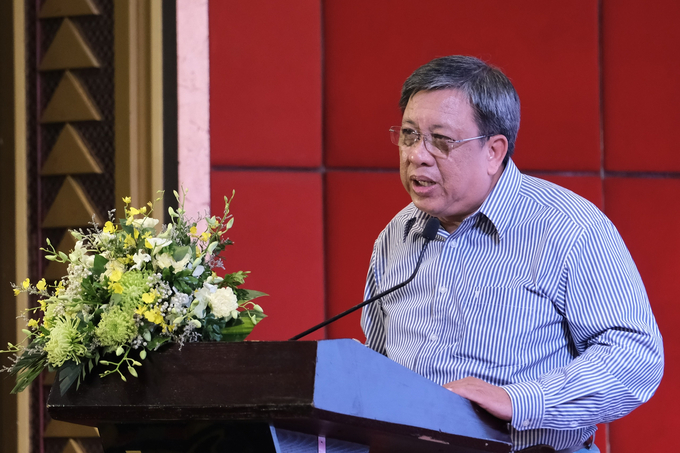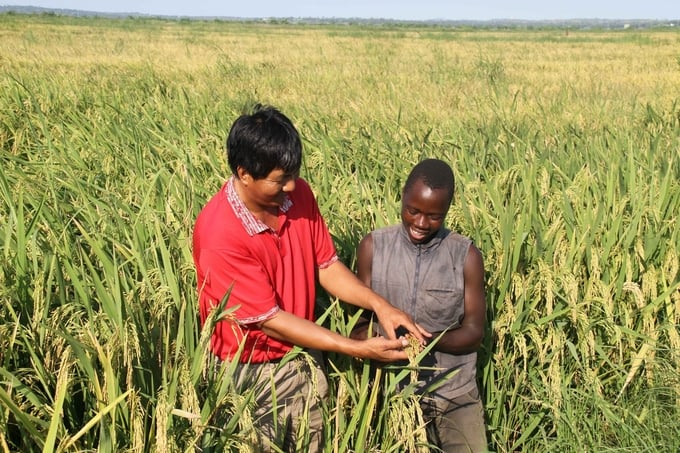October 5, 2025 | 19:08 GMT +7
October 5, 2025 | 19:08 GMT +7
Hotline: 0913.378.918
October 5, 2025 | 19:08 GMT +7
Hotline: 0913.378.918

Mr. Le Thanh Tung, Deputy Director of the Crop Production Department, said that rice production activities in Vietnam have not been solely focused on guaranteeing food security but also incorporated rice production into numerous national strategic programs. Photo: Quynh Chi.
After three decades of reform, Vietnam has emerged as the third-largest rice exporter in the world, following India and Thailand. From a food-scarce nation, Vietnam has become a major exporter of rice.
Vietnam's rice export turnover in 2023 was 8.13 million tons, valued at 4.67 billion USD, a 14% increase in volume and a 35.3% increase in turnover compared to 2022. Compared to 2021, there was a 30% increase in volume and a 42% increase in turnover.
According to Mr. Le Thanh Tung, Deputy Director of the Crop Production Department, rice production activities in Vietnam have not been solely focused on guaranteeing food security for many years. He shared his experience in rice production.
"We have incorporated rice production into numerous national strategic programs, such as the National Target Program on New Rural Development. The Vietnamese government has recently proposed cultivating 1 million hectares of high-quality, low-emission rice", Mr. Tung mentioned.
In order to sustain consistent rice production over the years, the agricultural sector has maintained close collaboration with localities and farmers, beginning at the lowest levels, such as villages and hamlets, despite the shrinking area reserved for rice cultivation. From there, the agricultural sector assists individuals in the development of rice production programs.
One of Vietnam's experiences is the identification of climate risks in planting areas, as well as the clear definition of the boundaries of various risk levels and the proposal of adaptation measures, such as changing the crop structure or shifting planting seasons.

Mr. Tung elucidated that Vietnam's numerous ecological regions are the cause of this phenomenon. For instance, the North experiences a frigid winter, while the Northwest region is frequently susceptible to flooding and encounters challenges in securing irrigation water sources. Furthermore, the Mekong Delta region boasts a high level of intensive cultivation, with some regions even able to cultivate seven crops within a two-year period.
By integrating catastrophe risk maps and plans for each subregion, Vietnam has established a series of best practices, including "1 must-do 5 reductions" and "3 reductions 3 increases." With the assistance of international organizations such as IRRI, the rice production regions in Vietnam are able to clearly identify each area's requirements.
"This serves as the foundation for the compilation of data, the development of crop schedules, and the interpretation of weather data. Thereby, disseminate and apply this knowledge to farmers through cooperatives, societies, partnerships, or organizations such as the farmers' union and women's union", Mr. Tung expressed his intention.
Vietnam's rice industry's overarching objective for the 2025-2030 period is to continue restructuring the rice sector to promote sustainable development and increased efficiency. The Department of Crop Production's administrators have established seven specific objectives. These include fully satisfying domestic consumption requirements, serving as a foundation for national food security, enhancing the quality, nutritional value, and food safety of rice, and establishing and improving the efficacy of the rice value chain.
Furthermore, the objectives encompass climate change adaptation and mitigation, the efficient utilization of resources and the preservation of the ecological environment, the enhancement of farmers' incomes and consumer benefits, and the exportation of high-quality, high-value rice.
Mr. Tung underscored the importance of constructing and establishing the rice value chain to ensure the rice industry's sustainable development, as demonstrated by Vietnam's experience. This entails integrating production services, including input suppliers and rice farmers, with logistics services and a commercial system that includes cooperatives, traders, milling factories, and sellers. The objective is to increase the value of rice, ensuring that it meets both domestic market quality and export standards.
As Mr. Tung has noted, the issue of rice varieties is another critical factor contributing to Vietnam's success in rice production. Rice has been one of the most successfully restructured sectors during the agricultural restructuring process. Vietnam had a mere 35-40% of high-quality rice varieties in the past. However, this figure has since increased to 75-80%, and in numerous localities, the utilization of high-quality rice varieties exceeds 90%.
This is one of the primary factors contributing to the enhanced quality of rice. In addition to promoting the export of high-quality, high-value rice, the new phase of rice restructuring also increases farmers' incomes and consumers' benefits.
African countries are currently facing many difficulties due to rice crises. Over a long period, Vietnam has supported these countries in improving management and developing the rice sector. Vietnam has the expertise, technology, and policies, but is limited in financial resources. Therefore, for South-South cooperation to be feasible, a third party is necessary. Fortunately, we have the support of some non-governmental organizations such as Food and Agriculture Organization (FAO), the World Bank (WB), and other international organizations. With more financial support from financial institutions, we can expand and strengthen South-South cooperation, thereby providing more assistance to African countries.
Translated by Linh Linh

(VAN) Meeting of ASEAN and Japanese Agriculture and Forestry Ministers adopts revised MIDORI cooperation plan, focusing on innovation and food security through 2030.

(VAN) Quang Ngai provincial authorities have fined three fishing boat captains a total of nearly VND 1.1 billion (around USD 44,000) and suspended their captain licenses for nine months for multiple violations on fishing regulations.

(VAN) The OPTOCE project, supported by Norway, helps Vietnam achieve dual benefits: reducing plastic leakage into the environment and decreasing cement industry’s reliance on coal.

(VAN) The 47th ASEAN Ministers on Agriculture and Forestry (AMAF) meeting approved the Food, Agriculture and Forestry Sector Plan of Action 2026-2030, which focuses on six priority areas.

(VAN) The Mekong River Commission strengthens cooperation with China and Myanmar and develops a strategic orientation for the 2026 - 2030 period.

(VAN) A loan of nearly 145 million USD from the Integrated Resilient Development Project will support Vietnam on disaster risk management and sustainable infrastructure.

(VAN) The German Agency for International Cooperation (GIZ) will support Viet Nam in technology transfer to build an affordable, net-zero energy system.